As we navigate the intricate corridors of healthcare, the integration of Artificial Intelligence (AI) emerges as a beacon of transformation, guiding us toward a new horizon of medical practice and patient experience.
This fusion of AI with healthcare is not a mere addition but a revolutionary force poised to reshape our understanding and management of health and disease.
The drive towards integrating AI into healthcare springs from an acute necessity to elevate precision, effectiveness, and customization in medical care, responding to the ever-increasing complexity of health conditions and the exponential growth of medical data.
At the vanguard of this evolution, AI's incursion into healthcare answers a call for innovation—a call dictated by the overwhelming deluge of data and the critical need for advanced analysis and insight.
The sophistication of AI technology allows us to parse through this data deluge, unveiling patterns, predicting health risks before they manifest, and illuminating paths to personalized treatment that remain obscured in the vast expanse of information.
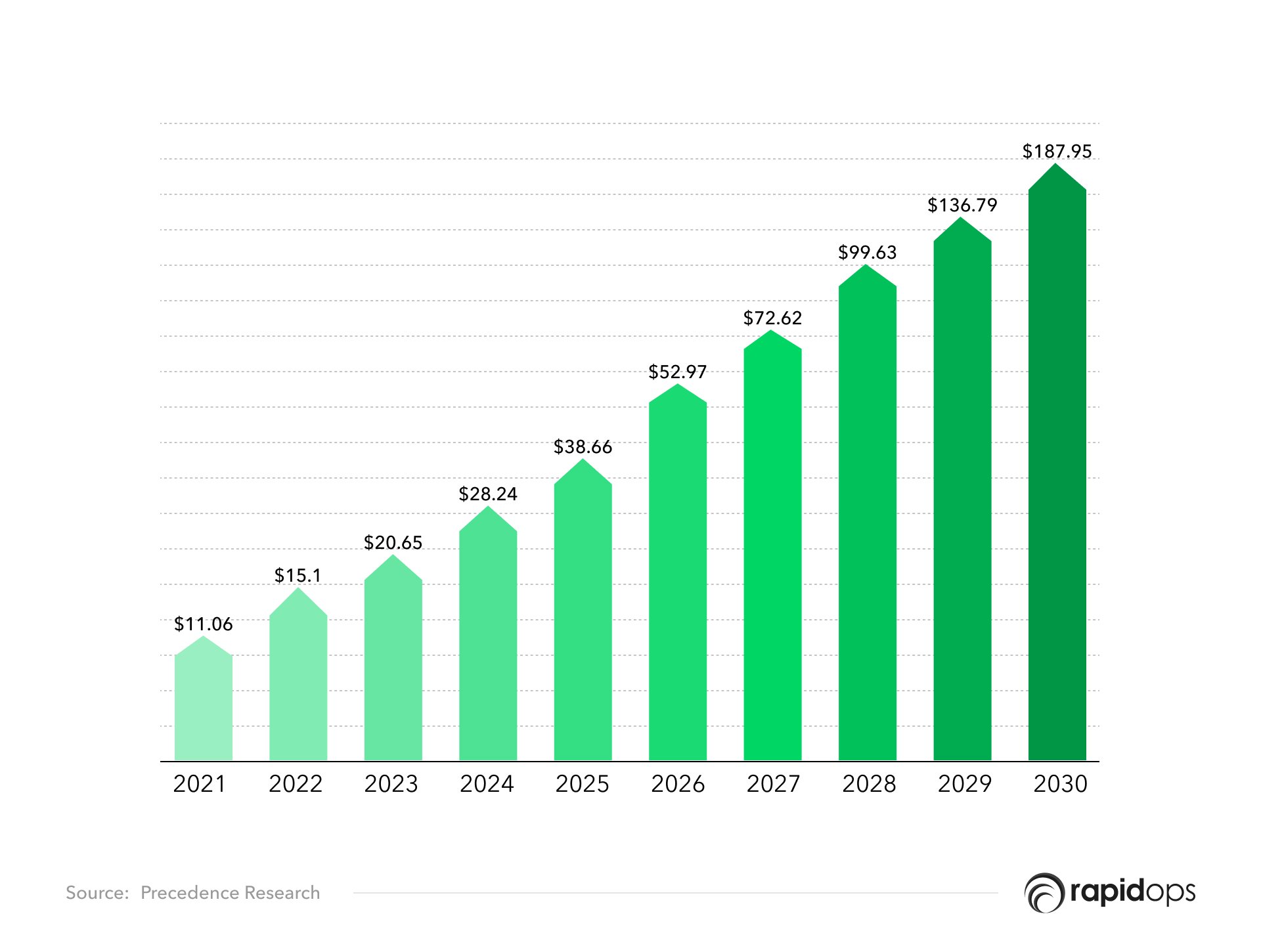
The narrative of AI in healthcare is underscored by its astonishing growth. In 2022, the sector's valuation stood at USD 15.1 billion, with forecasts predicting a leap to USD 187.95 billion by 2030, according to Precedence Research.
This trajectory is a testament to AI's potential and rapidly solidifying role in shaping the future of healthcare, particularly highlighted by its dominance in the North American market, which accounted for USD 6.8 billion of the global valuation.
AI's utility spans the spectrum of healthcare applications, from enhancing diagnostic accuracy and facilitating early detection of diseases such as cancer and cardiac conditions to managing chronic diseases with unprecedented precision.
By leveraging vast datasets from medical records, imaging, and real-time health monitoring, AI crafts a new healthcare paradigm—personalized, predictive, and precise.
This article aims to explore the heart of AI's role in healthcare. We will explore AI's transformative applications across various domains, from diagnostics to treatment personalization, and the cutting-edge technologies driving this integration.
Join us as we explore how some AI use cases in healthcare change and revolutionize the industry, heralding a new era of medical excellence and patient-centric care.
Revolutionizing patient care with AI in healthcare industry
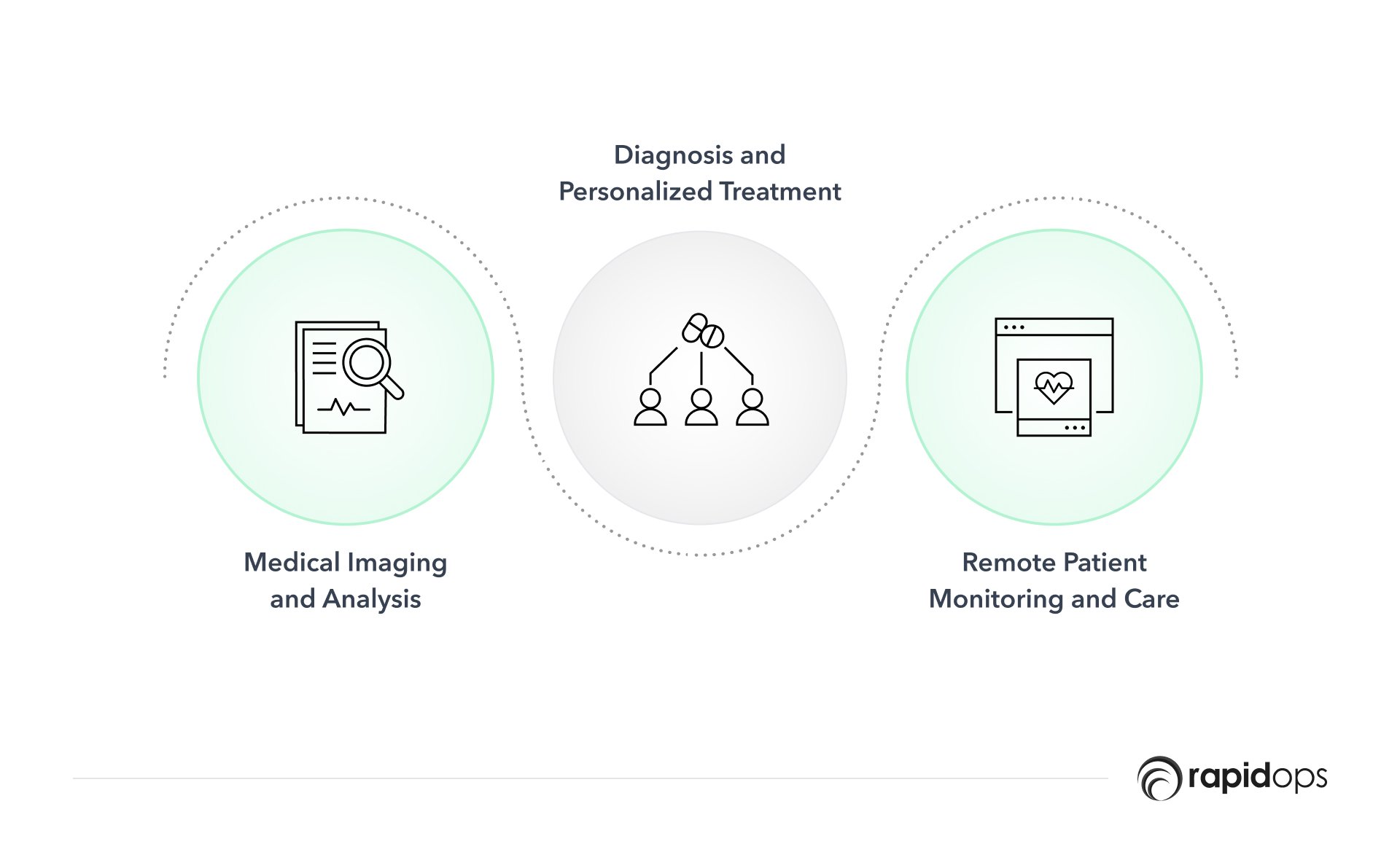
Medical imaging and analysis
When it comes to patient care, AI's influence shines brightly through medical imaging and analysis, where deep learning algorithms have become the linchpin in diagnosing diseases with previously unattainable precision.
These sophisticated algorithms delve into the depths of radiology images, identifying subtle patterns and indicators of diseases such as cancer, heart conditions, and more, far beyond the scope of human eyes.
This accelerates the diagnostic process and enhances its accuracy, offering a beacon of hope for early intervention and treatment.
The integration of AI in medical imaging stands as a testament to technology's potential to extend and enhance human capabilities, offering clearer, more detailed insights into the human body.
With each scan, AI-powered systems learn and adapt, continuously improving their diagnostic precision and, in turn, transforming the landscape of medical imaging into a dynamic field of rapid innovation and improved patient outcomes.
Diagnosis and personalized treatment
Beyond imaging, AI's capabilities extend to revolutionizing diagnosis and personalized treatment.
Utilizing vast datasets, AI algorithms can predict diseases before symptoms manifest, allowing healthcare providers to offer proactive rather than reactive care.
This forward-thinking approach is groundbreaking in managing chronic diseases, where AI's predictive analytics can tailor treatment plans to the individual, considering their medical history, genetic predispositions, and lifestyle factors.
In personalized treatment, AI bridges the wealth of medical data and each patient's unique needs, crafting treatment plans as unique as the individuals they serve.
This not only enhances the efficacy of treatments but also minimizes side effects and optimizes recovery paths, heralding a new era of patient-centric care that is both informed and precise.
Remote patient monitoring and care
As healthcare continues to evolve, the significance of remote patient monitoring and care has skyrocketed, propelled by AI's advancements.
AI-powered tools and applications now enable continuous monitoring of patient's health statuses from the comfort of their homes, alerting healthcare providers to potential issues before they become emergencies.
This aspect of AI in healthcare epitomizes the shift towards more accessible, preventive, and personalized care, extending the reach of healthcare providers beyond the confines of traditional settings.
Remote patient care facilitated by AI enhances the efficiency and effectiveness of healthcare delivery and empowers patients to take an active role in their health management.
Through wearable devices, mobile apps, and other AI-driven technologies, patients and providers can engage in a continuous dialogue, ensuring timely interventions and fostering a collaborative approach to healthcare that is both empowering and inclusive.
Enhancing healthcare operations
The transformative power of AI extends beyond patient care into the operational heart of healthcare, streamlining processes, enhancing efficiency, and fortifying security measures.
This section explores how AI is redefining Electronic Health Records (EHRs), combating fraud, and automating administrative tasks, ensuring that healthcare organizations can focus more on patient care and less on the burdens of bureaucracy.
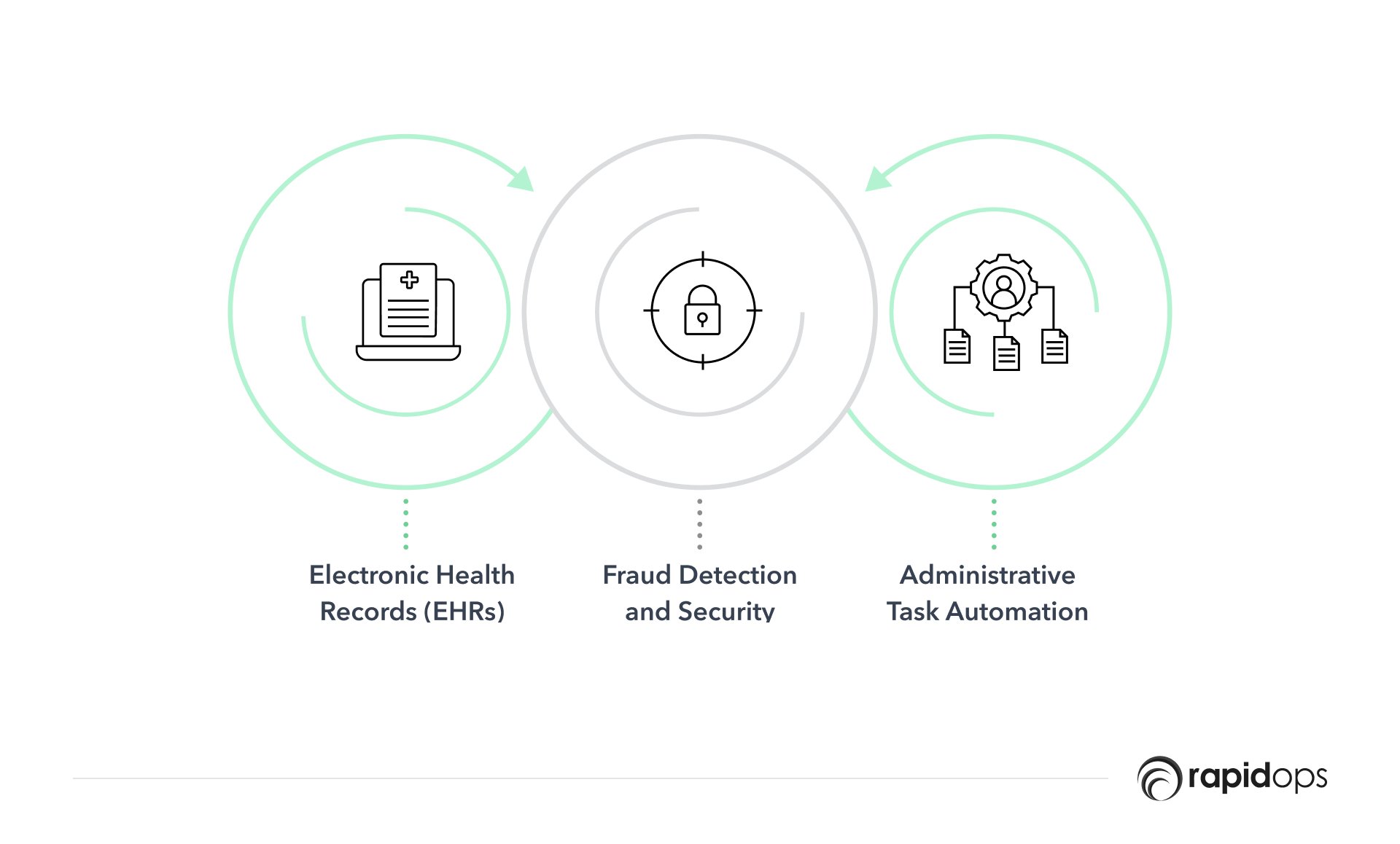
Electronic health records (EHRs)
The advent of Artificial Intelligence (AI) has brought about a seismic shift in the management of Electronic Health Records (EHRs), a cornerstone of modern healthcare systems.
By leveraging natural language processing (NLP) and sophisticated AI algorithms, healthcare providers can navigate the vast seas of patient data with unprecedented ease and accuracy.
This integration transforms EHRs from digital repositories to dynamic systems that enhance patient care through improved data accuracy and accessibility.
AI's role in EHRs goes beyond simple data management; it redefines how medical records are used, making predictive analytics a reality in healthcare delivery.
By analyzing patient histories, treatment outcomes, and real-time health data, AI-powered EHRs can forecast patient risks and suggest personalized treatment plans.
This revolution in electronic health records management underscores the importance of natural language processing and medical records management, ensuring healthcare professionals can provide informed and tailored care to individual patient needs.
Fraud detection and security
In the complex web of healthcare transactions, AI has emerged as a vigilant protector against fraud, ensuring the integrity and security of healthcare systems.
Utilizing advanced AI algorithms to scrutinize billing patterns and insurance claims, these systems can swiftly identify discrepancies and potential fraud, safeguarding financial resources and maintaining trust in healthcare administration.
This application of AI extends beyond mere detection; it's a proactive stance against the misuse of healthcare funds, ensuring that resources are allocated where they are most needed.
In doing so, AI protects organizations and ensures patients are shielded from the repercussions of fraudulent activities.
Integrating AI in fraud detection and securing insurance claims is pivotal, marking a significant advancement in maintaining the healthcare systems' resilience and reliability.
Administrative task automation
Implementing AI in automating administrative tasks within healthcare settings heralds a new era of efficiency and accuracy.
By taking over routine tasks such as appointment scheduling, patient record updating, and insurance claim processing, AI-powered virtual assistants and chatbots are freeing healthcare professionals from the shackles of paperwork, allowing them to focus more on patient care.
This shift is not just about streamlining operations; it's about transforming the healthcare experience for providers and patients.
With AI handling administrative tasks and automating administrative tasks, healthcare facilities can offer more personalized and timely care, enhancing patient satisfaction and outcomes.
The deployment of virtual health assistants is a testament to AI's potential to enrich healthcare services, making care more accessible and efficient.
Advancing healthcare through AI-driven innovations
Integrating Artificial Intelligence (AI) into healthcare has revolutionized patient care and operational efficiencies and significantly propelled pharmaceutical research, clinical decision-making, and predictive analytics.
This section delves into AI's pivotal role in these domains, showcasing its transformative impact on advancing healthcare innovations.
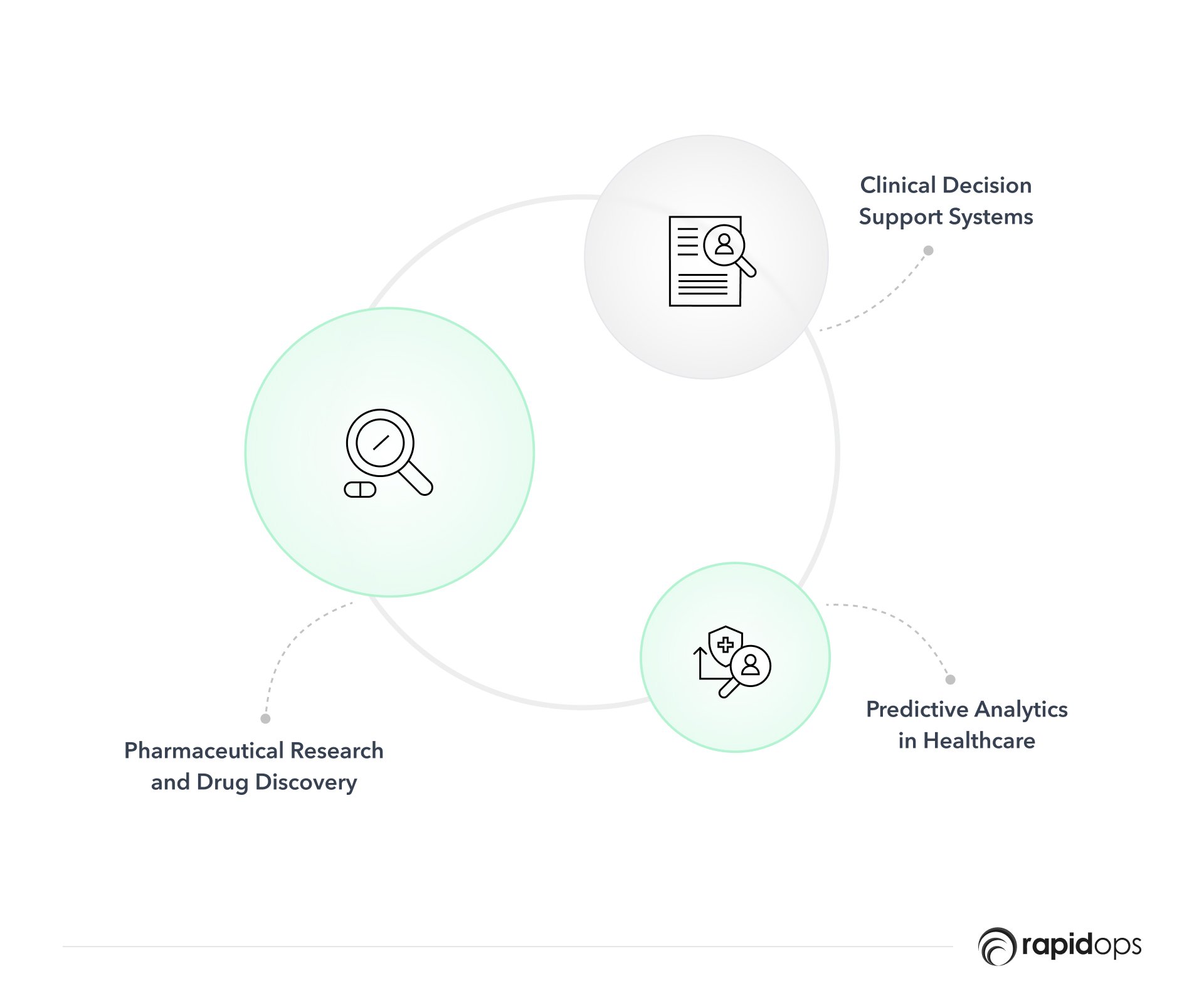
Pharmaceutical research and drug discovery
The transformative impact of Artificial Intelligence (AI) in pharmaceutical research, the drug discovery process, and the management of clinical trials is reshaping the landscape of pharmacology.
AI's ability to rapidly analyze vast datasets, including biological compounds and genetic information, is not just accelerating the pace at which potential drug candidates are identified but is also streamlining the subsequent stages of development.
This streamlined approach reduces the time and financial investment required to bring new medications to market and enhances the precision and effectiveness of these therapeutic solutions.
AI technologies are indispensable allies in navigating the intricate journey from conceptualization to realizing new drugs.
They offer predictive insights that inform decision-making during clinical trials, identifying the most promising paths forward.
This efficiency gains significance in personalized medicine, where treatments are increasingly tailored to the genetic profiles of individual patients, promising more targeted and effective care.
Integrating AI within these critical phases of drug development marks a significant evolution in how we approach health challenges. It will enable a future where innovations reach patients faster, and treatments become more personalized and effective.
Clinical decision support systems
Artificial Intelligence (AI) is revolutionizing how medical professionals make decisions, particularly through the advent of Clinical Decision Support Systems (CDSS) in healthcare.
These advanced systems analyze patient information in real-time, providing healthcare professionals with evidence-based recommendations to enhance the accuracy and effectiveness of diagnoses and treatment plans.
The power of AI in these systems lies in their ability to process and interpret vast amounts of data from diverse sources, including electronic health records, genetic information, and ongoing research findings.
This comprehensive analysis enables a level of precision in patient care that was previously unattainable. It allows predictive analytics to forecast potential patient risks and recommend preemptive interventions.
By harnessing AI's capabilities, CDSS facilitates a more integrated approach to healthcare. Medical professionals can now access a holistic view of a patient's health, enabling informed decisions tailored to the individual's unique medical history and needs.
This approach improves patient outcomes and contributes to the broader shift towards personalized medicine, where treatment strategies are customized for maximum efficacy.
Integrating AI into clinical decision-making processes exemplifies a significant advancement in healthcare technology.
It represents a move towards a more data-driven and patient-centric approach, where the insights derived from AI algorithms support healthcare professionals in delivering precise and personalized care.
Predictive analytics in healthcare
Predictive analytics stands at the forefront of AI's contributions to healthcare, offering a window into the future of patient care.
Through the analysis of extensive health data, AI models can forecast potential health events before they occur, enabling a shift from reactive to preventive care.
This anticipatory approach aims for better health outcomes, reducing the incidence of preventable diseases and minimizing the need for acute interventions.
AI-driven predictive analytics empower healthcare providers to identify at-risk patients early, implement timely preventative measures, and monitor the effectiveness of interventions, all tailored to individual patient profiles.
This enhances patient care and optimizes healthcare resources, ensuring interventions are directed where they are most needed.
Integrating predictive analytics in healthcare, focusing on better health outcomes, highlights AI's capacity to transform the care paradigm from treatment to prevention, embodying the essence of future healthcare practices.
Check our infographic to know how AI is revolutionizing the healthcare industry!
Download Now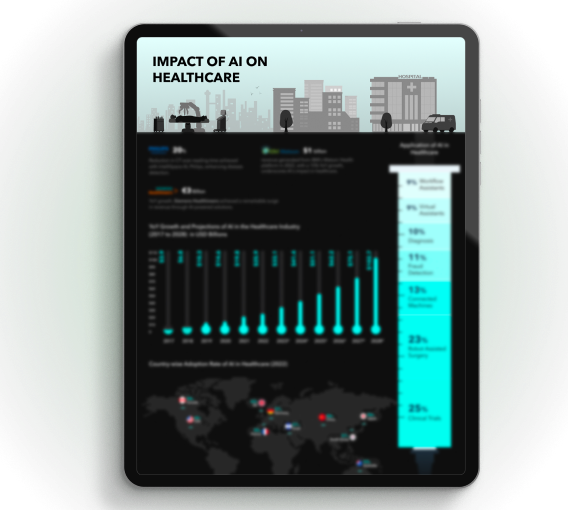
Implementing AI in healthcare: Strategies and considerations
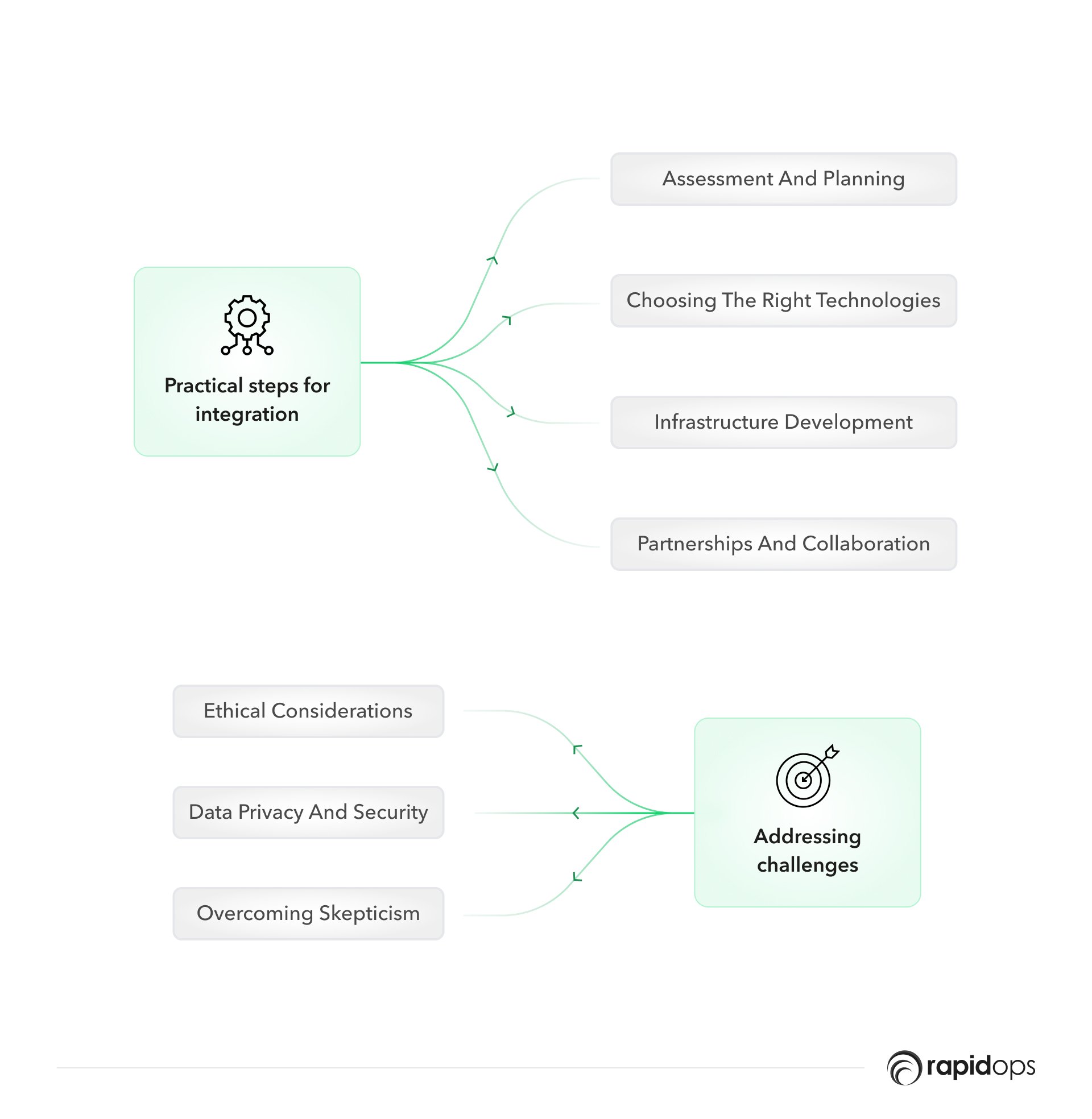
Integrating Artificial Intelligence (AI) into healthcare settings represents a significant leap toward enhanced patient care and operational efficiency.
However, adopting AI technologies comes with its own set of challenges and considerations. This section outlines practical steps for healthcare organizations to effectively implement AI, alongside addressing potential hurdles.
Practical steps for integration
Assessment and planning
The first step in implementing AI in healthcare organizations involves thoroughly assessing existing systems and identifying areas where AI can have the most impact.
This could range from diagnostic tools to administrative automation. Developing a clear strategy that aligns with the organization's goals and patient needs is important here.
Choosing the right technologies
Not all AI solutions are created equal. Selecting the right AI technologies that meet specific organizational needs is essential. Healthcare providers should look for scalable, interoperable solutions with existing systems that have proven efficacy in similar healthcare settings.
Infrastructure development
Robust IT infrastructure is the backbone of AI integration. Healthcare organizations must have the hardware, software, and secure, high-capacity data storage solutions to support AI applications.
Partnerships and collaboration
Collaborating with AI technology providers and other healthcare organizations can provide access to valuable insights and resources. Partnerships are essential for sharing best practices, overcoming common challenges, and driving innovation in AI deployment.
Addressing challenges
Staff Training and Adoption: One of the significant barriers to AI integration is the resistance to change and the skill gap among existing staff.
Providing comprehensive training and demonstrating the benefits of AI can facilitate smoother adoption. Healthcare professionals and medical staff must know how to work alongside AI tools effectively.
Ethical considerations
AI brings ethical considerations, particularly concerning decision-making in patient care. Healthcare organizations must ensure that AI systems are transparent, accountable, and aligned with ethical standards.
Establishing guidelines for ethical AI use is fundamental to maintaining trust and integrity in healthcare delivery.
Data privacy and security
Protecting patient data is paramount in healthcare. AI systems process vast amounts of sensitive information, making them potential targets for data breaches.
Implementing stringent data privacy measures and ensuring compliance with regulations like HIPAA (Health Insurance Portability and Accountability Act) is essential.
Overcoming skepticism
Skepticism among healthcare professionals and patients about AI's reliability and effectiveness can hinder its adoption.
Addressing these concerns through education, transparent communication, and showcasing successful case studies can help build confidence in AI technologies.
By addressing these considerations and following strategic steps, healthcare organizations can navigate the complexities of AI integration more effectively.
The successful implementation of AI in healthcare settings promises to revolutionize patient care, enhance operational efficiencies, and pave the way for innovative healthcare solutions.
As healthcare providers, professionals, and medical professionals embrace AI, the potential for improved patient outcomes and healthcare delivery becomes increasingly tangible.
AI technologies overview: Powering innovations in healthcare industry
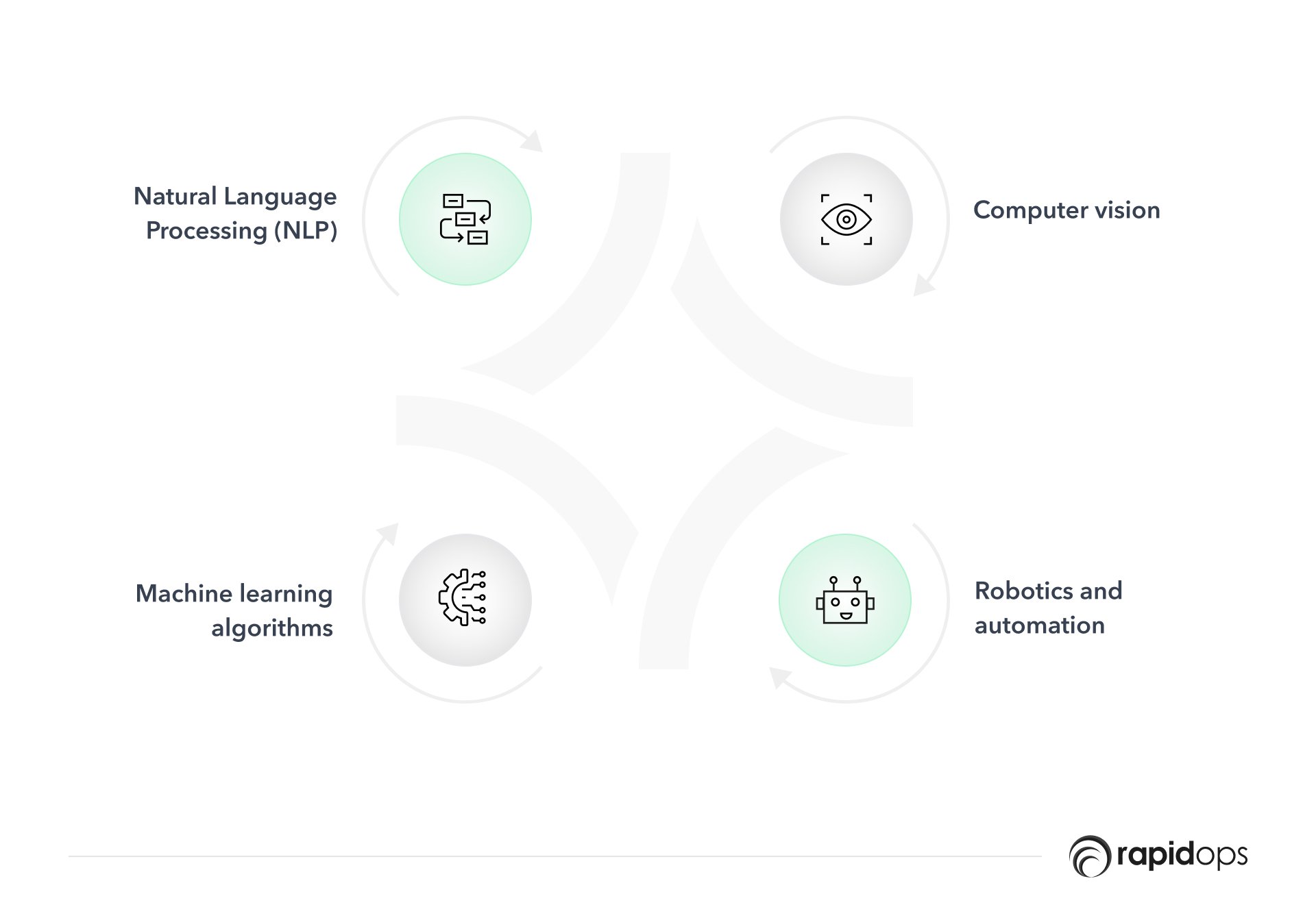
Integrating Artificial Intelligence (AI) and machine learning technologies into healthcare is catalyzing a new era of medical innovation, enhancing patient care, and streamlining healthcare operations.
At the heart of this transformation are key AI technologies, each contributing uniquely to advancing healthcare services and management.
The article covered the role of predictive maintenance in the healthcare industry. This section introduces other core AI and machine learning technologies that drive these innovations, including natural language processing and computer vision.
Natural Language Processing (NLP)
Natural Language Processing (NLP) is a pivotal AI technology in healthcare, enabling machines to understand and interpret human language.
Its vast applications range from managing electronic health records (EHRs) to analyzing clinical notes.
NLP can extract relevant information from unstructured data, such as patient histories and diagnostic reports, making it easier for healthcare providers to access and analyze critical information.
This capability enhances decision-making processes, improves patient outcomes, and facilitates personalized care by providing insights into individual health records.
Computer vision
Computer vision technology empowers computers to interpret and make sense of visual information from the world, akin to human vision.
In healthcare, computer vision revolutionizes medical imaging by providing detailed analyses of images such as X-rays, MRIs, and CT scans.
This technology enables the detection of diseases at early stages by identifying abnormalities with high precision.
Computer vision applications extend to monitoring patient movements in physical therapy, automating lab tests, and even assisting in surgical procedures, enhancing diagnostic and therapeutic healthcare services.
Machine learning algorithms
Machine learning, a subset of AI, involves algorithms that enable computers to learn from and make predictions or decisions based on data.
In healthcare, machine learning algorithms analyze vast datasets to identify patterns and correlations that humans might not notice. These insights can predict disease outbreaks, patient outcomes, and the effectiveness of treatment plans.
Machine learning also supports the development of personalized medicine, where treatments are tailored to the genetic makeup and lifestyle of the individual, improving the efficacy of healthcare interventions.
Robotics and automation
Robotics and automation in healthcare offer significant improvements in surgical procedures, patient care, and the automation of routine tasks.
Surgical robots, guided by AI and machine learning, can perform complex procedures with precision and flexibility beyond human capabilities.
Automation technologies streamline administrative tasks, such as appointment scheduling and patient triage, reducing the workload on healthcare staff and allowing them to focus more on patient care.
The future of AI in healthcare industry
The exploration of AI in healthcare is entering an exciting phase, characterized by the convergence of advanced technologies and innovative applications.
This transition heralds a future where healthcare delivery and patient care are transformed and significantly optimized for efficiency, personalization, and accessibility.
Emerging trends in AI and healthcare industry
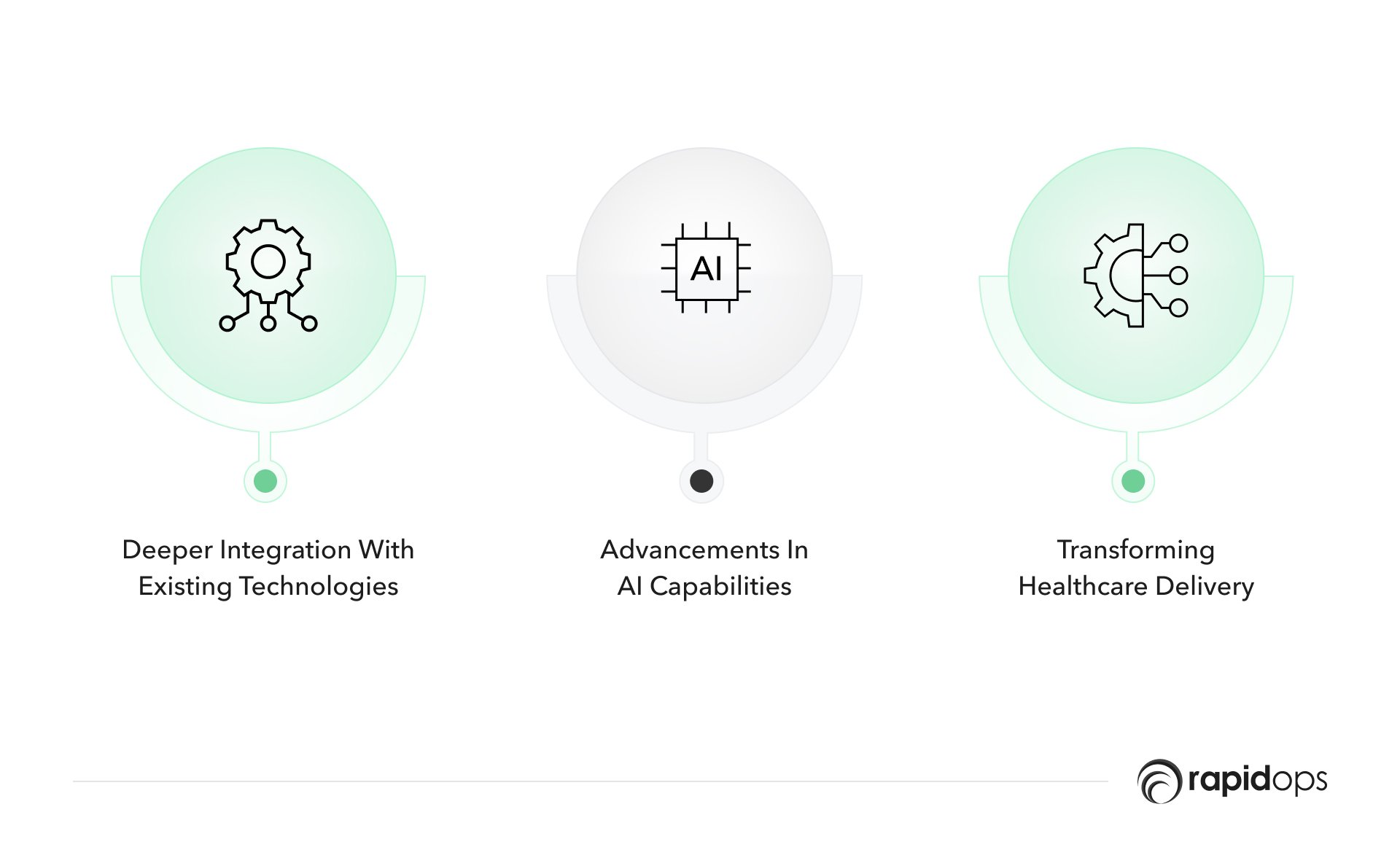
The exploration of AI in healthcare is entering an exciting phase, characterized by the convergence of advanced technologies and innovative applications.
This transition heralds a future where healthcare delivery and patient care are transformed and significantly optimized for efficiency, personalization, and accessibility.
Deeper integration with existing technologies
Fusing AI with the Internet of Things (IoT) and blockchain presents new avenues for enhancing healthcare services. Wearable devices and home monitoring systems powered by AI will enable real-time health data collection and analysis.
This integration promises a more proactive approach to healthcare, emphasizing preventative care and early detection of conditions.
When combined with AI, blockchain technology offers a robust framework for managing patient data.
This synergy ensures health records' integrity, security, and privacy, facilitating a more trusted and efficient healthcare system.
The potential for these technologies to streamline supply chains, ensure quality control, and enable smart prediction in healthcare logistics cannot be overstated.
Advancements in AI capabilities
The evolution of AI in healthcare also includes significant advancements in algorithm transparency and data privacy.
Explainable AI (XAI) will demystify the decision-making processes of AI systems, fostering trust among healthcare professionals and patients alike.
Meanwhile, federated learning represents a leap forward in privacy-preserving AI, allowing for more generalized AI models without direct access to sensitive patient data.
Transforming healthcare delivery
AI's impact on healthcare delivery is multifaceted, ranging from improved diagnostic and treatment capabilities to more personalized patient care.
Surgical robots, enhanced with AI, are set to perform with unprecedented precision, reducing the margin for error and improving patient outcomes.
Beyond the operating room, AI's role in developing personalized medicine—tailoring treatment plans to individual genetic profiles and health histories—promises a future where healthcare is as unique as the patient.
Potential impact and considerations
The integration of AI in healthcare is poised to:
-
Enhance diagnostic accuracy and treatment efficiency, significantly improving patient outcomes.
-
Make healthcare more accessible, especially in underserved or remote areas, by leveraging AI-powered remote monitoring and diagnostic tools.
-
Reduce healthcare costs through early detection, preventative care, and optimized resource allocation.
-
Empower patients to actively participate in their health management, aided by personalized insights and recommendations from AI systems.
However, this future is not without its challenges. Ethical concerns regarding data privacy, potential biases in AI algorithms, and the imperative to maintain a human touch in healthcare underscore the need for careful consideration and strategic planning.
As we navigate these challenges, the focus must remain on leveraging AI to complement and enhance the human elements of healthcare, ensuring that technology amplifies rather than replaces the irreplaceable human connection in patient care.
The journey toward AI-powered healthcare involves collaboration, innovation, and responsibility. As we look to the future, the potential for AI to revolutionize healthcare is clear.
Still, its successful implementation will depend on a balanced approach that respects patient privacy, addresses ethical concerns, and maintains the centrality of human judgment and empathy in healthcare decisions.
Ethical and regulatory challenges in AI healthcare integration
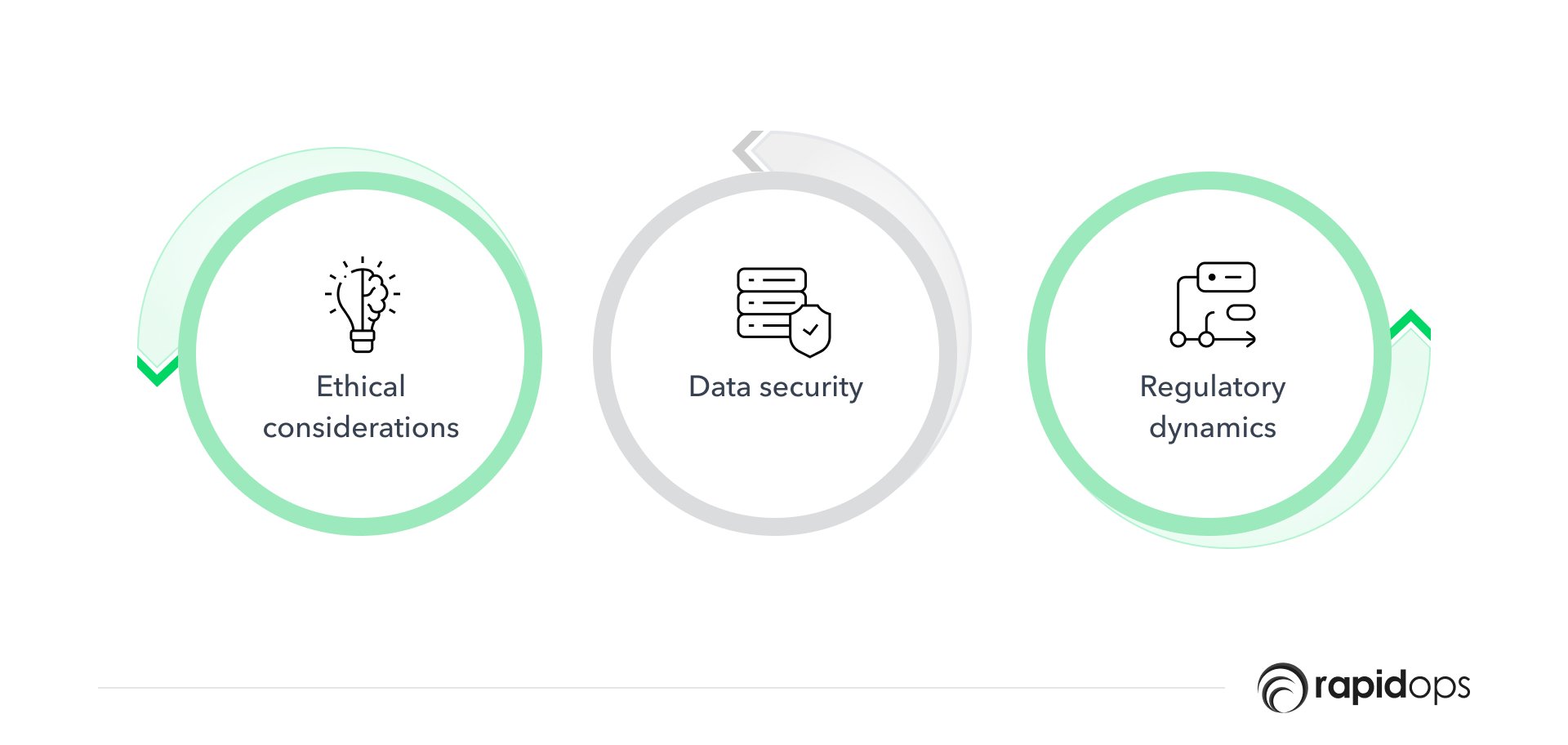
Incorporating AI into healthcare introduces significant ethical and regulatory challenges that must be addressed to ensure its responsible and fair use.
Ethical considerations
The deployment of AI in healthcare raises important ethical questions, especially concerning privacy, consent, and transparency.
The capacity of AI to process extensive data, including sensitive patient information, highlights the importance of maintaining privacy and obtaining informed consent.
Additionally, transparency in AI decision-making processes is crucial for building trust and identifying biases, ensuring fair treatment for all patients.
Data security
The shift towards digital storage of patient information increases the risk of data breaches.
While AI offers sophisticated threat detection and prevention tools, it also presents potential vulnerabilities. Balancing these aspects is critical to protect patient data from unauthorized access and cyber threats.
Regulatory dynamics
The regulatory environment for AI in healthcare constantly evolves to keep pace with technological progress. Regulators aim to encourage innovation while safeguarding patient safety and data privacy.
This involves creating flexible regulatory frameworks that adapt to AI advancements and promoting international cooperation to set global AI standards in healthcare, ensuring efficient data exchange and adherence to various regional regulations.
A collaborative approach involving stakeholders from multiple sectors is essential to navigate these challenges.
Through open dialogue and cooperation, we can address the ethical and regulatory issues surrounding AI in healthcare, ensuring its development and use align with ethical norms, safeguard data, and meet regulatory requirements.
Conclusion
AI's integration into healthcare promises significant advancements, from improving diagnostics and personalized treatment to revolutionizing patient care and healthcare management.
However, this potential comes with the responsibility to address ethical and regulatory challenges head-on.
It's crucial to tackle issues related to privacy, data security, and equitable access to AI-enhanced healthcare solutions.
Healthcare professionals, industry leaders, and policymakers can leverage AI's benefits while adhering to ethical standards and regulatory guidelines.
As we venture into this promising future, a concerted effort to navigate these complexities responsibly will enable us to utilize AI in healthcare effectively, ensuring equitable and sustainable benefits for all.
This approach will lead to technological advancements and a comprehensive shift in our healthcare paradigms, prioritizing collaborative, innovative, and ethical practices.
Partnering with the best AI development company
Rapidops is the go-to partner for healthcare businesses aiming to leverage AI for superior patient care and operational excellence.
Specializing in healthcare, we offer predictive analytics for early health interventions, personalized care through AI, and NLP-driven chatbots for instant patient support, all while ensuring the highest data privacy and security standards.
Our tailored AI solutions, including custom Generative AI models, are designed to streamline healthcare operations, enhance diagnostic accuracy, and improve patient outcomes.
Partnering with Rapidops means adopting cutting-edge AI technology to meet and exceed modern healthcare challenges.
What are the use cases of AI in healthcare?
AI is used for diagnostic assistance, personalized medicine, clinical decision support, operational efficiencies, drug discovery and development, patient engagement through chatbots, and predictive analytics for patient care management.
How will AI be used in healthcare in 2024 and beyond?
In 2024 and beyond, AI is set to further revolutionize healthcare through several transformative trends:
- Generative AI will play a significant role in assisting healthcare professionals and organizations. It will streamline administrative tasks by synthesizing extensive reports and documents, reducing clinicians' time on paperwork. This technology will also support clinical documentation and enhance the efficiency of radiologists, pathologists, and laboratory workers by facilitating the review of vast result sets, thereby easing the cognitive load on caregivers.
- Administrative optimization is another area where AI will bring about significant improvements. The technology will address cost pressures, staffing shortages, fragmented technologies, and administrative complexities. AI tools, including chatbots, will minimize healthcare providers' time on administrative tasks, enabling them to dedicate more time to patient care.
- As AI's footprint in healthcare expands, ethical considerations and regulatory frameworks will become increasingly important. Ensuring AI's application upholds patient privacy, data security, and equitable treatment will be critical. This focus will guide developing and deploying AI technologies in healthcare, ensuring they align with societal values and legal standards.
- The overarching impact of AI will be observed in the long-term evolution of healthcare practices and policies. A deeper understanding of AI's capabilities and applications will emerge, benefiting healthcare regulators, researchers, and practitioners. This comprehensive insight will drive the development of more effective treatments and the delivery of superior patient care.
What is an example of a use case in healthcare?
An example includes AI-driven imaging tools that help radiologists detect diseases, such as cancer, more accurately and at earlier stages by analyzing images for subtle patterns that may escape the human eye.
What problems does AI in healthcare solve?
AI addresses challenges such as reducing diagnostic errors, managing large volumes of patient data, predicting disease outbreaks, enhancing patient care delivery, and streamlining pharmaceutical research.
What are the problems with AI in healthcare?
Challenges include data privacy concerns, the need for large, diverse datasets to train AI models, potential biases in AI algorithms, integration with existing healthcare systems, and regulatory compliance requirements.
Will AI replace healthcare workers?
No, AI will not replace healthcare workers but rather augment their capabilities. It is intended to enhance decision-making, reduce administrative burdens, and allow healthcare professionals to spend more time on patient care.
How is AI used in healthcare decision-making?
AI supports decision-making by providing healthcare professionals with data-driven insights, predictive analytics, and evidence-based recommendations, improving patient outcomes and operational efficiency.

Saptarshi Das
Content Editor
9+ years of expertise in content marketing, SEO, and SERP research. Creates informative, engaging content to achieve marketing goals. Empathetic approach and deep understanding of target audience needs. Expert in SEO optimization for maximum visibility. Your ideal content marketing strategist.
What’s Inside
- Revolutionizing patient care with AI in healthcare industry
- Enhancing healthcare operations
- Advancing healthcare through AI-driven innovations
- Implementing AI in healthcare: Strategies and considerations
- AI technologies overview: Powering innovations in healthcare industry
- The future of AI in healthcare industry
- Emerging trends in AI and healthcare industry
- Ethical and regulatory challenges in AI healthcare integration
- Conclusion

Let’s build the next big thing!
Share your ideas and vision with us to explore your digital opportunities
Similar Stories
- AI
- 4 Mins
- September 2022

- AI
- 7 Mins
- April 2023


Receive articles like this in your mailbox
Sign up to get weekly insights & inspiration in your inbox.

